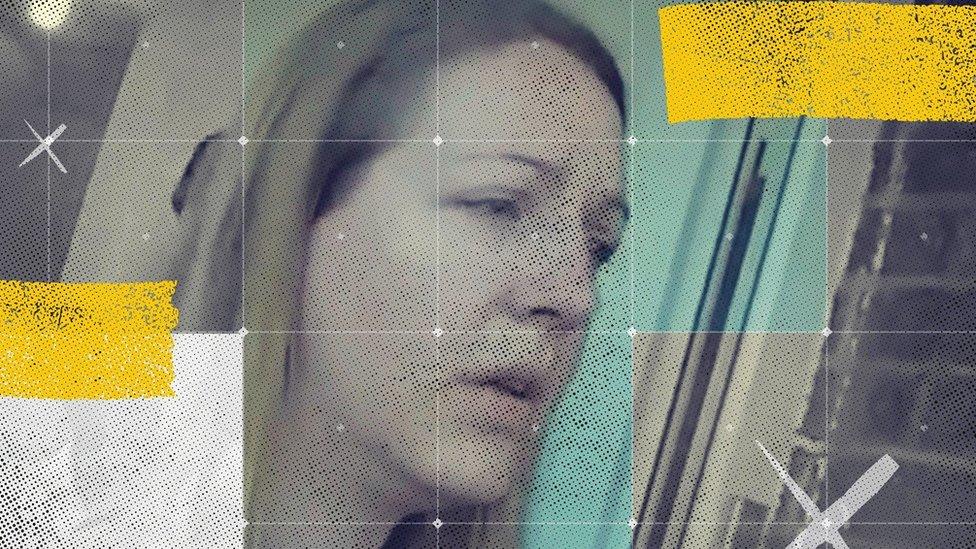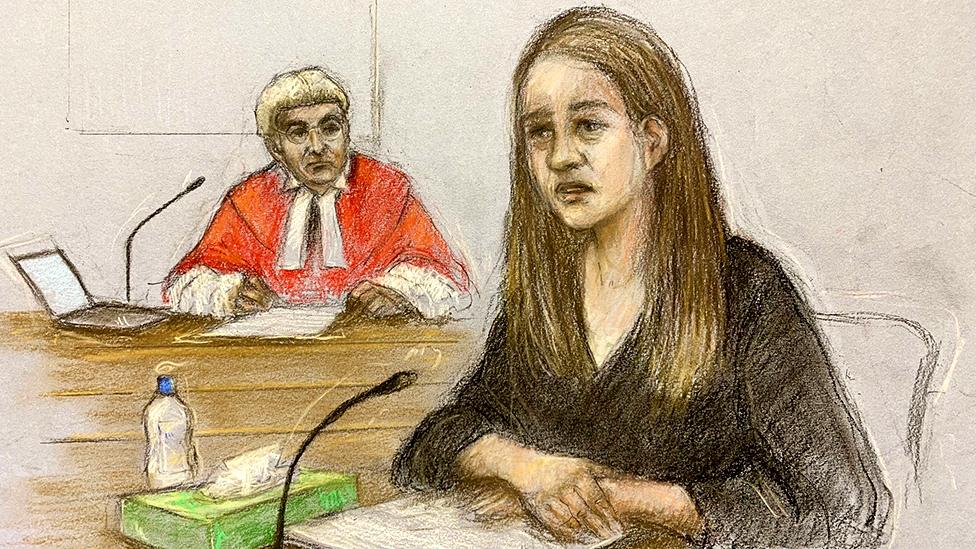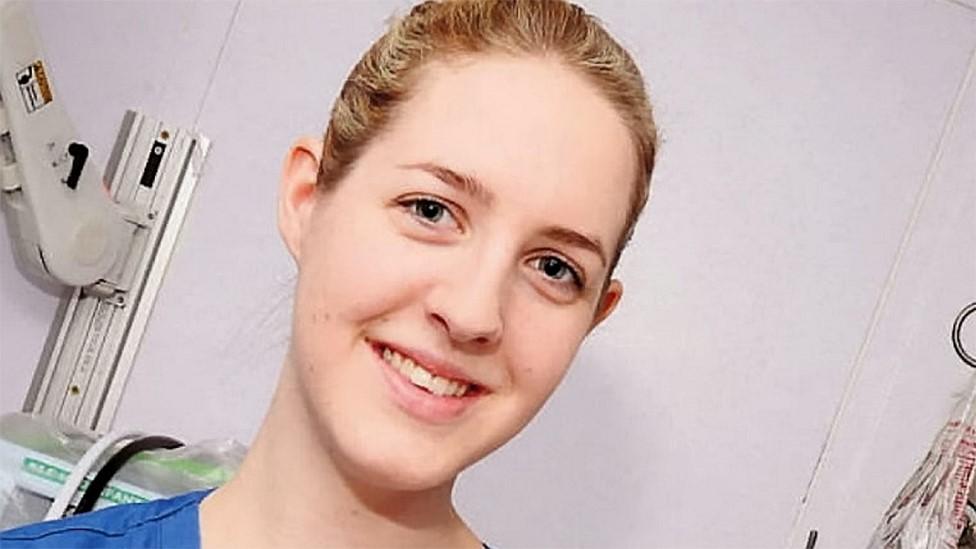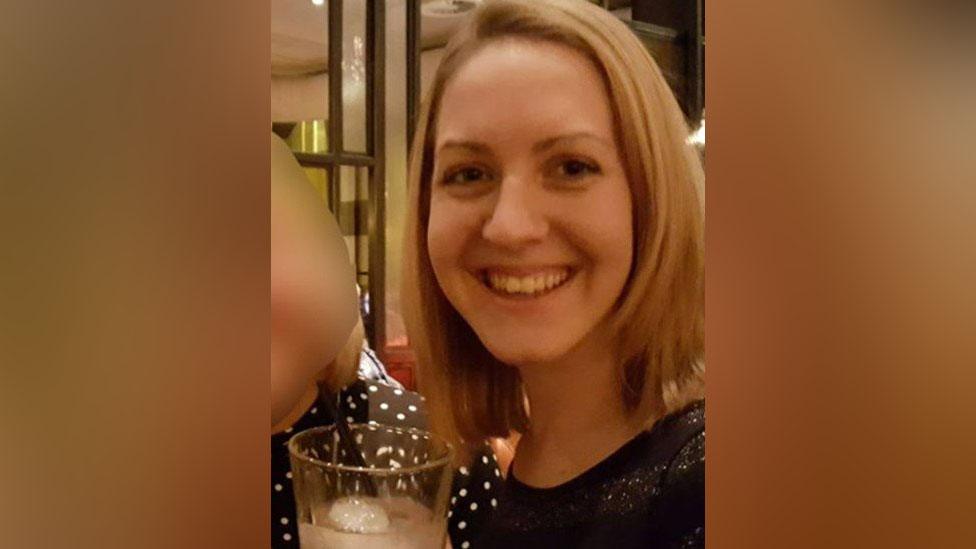Lucy Letby: What happens next with inquiry, prison and police review
- Published

Lucy Letby will spend the rest of her life in prison
Lucy Letby has been jailed for life for murdering seven babies and attempting to kill six more.
Yet many unanswered questions surround the case of the worst child serial killer in modern British history - including whether there could be a retrial, an appeal, a civil case against hospital bosses or fresh allegations stemming from a police review.
We look at what happens next in a case that could have profound effects on the British health and justice systems.
The prisoner
Letby has been in custody since November 2020.
On Monday, she was sentenced to a "whole life order" meaning she will die in prison. She is only the fourth female criminal in British history to have no hope of parole.
Letby is expected to be categorised as a "restricted status" prisoner - the female equivalent of a Category A inmate - which is imposed to minimise the possibility of escape and protect the public from harm.
There are only three prisons in England and Wales where restricted status prisoners are held - HMP Low Newton in Co Durham, HMP Bronzefield in Surrey and HMP New Hall in Yorkshire.
Tom Nicholson, a criminal barrister, told the BBC that whole life term prisoners mean "maximum security conditions, visiting restrictions and restrictions on how they operate in prison."
There would be "specific conditions that will apply in order to minimise the chances of them escaping", he added.
He said that the prison governor would also have to consider what risk the prisoner had of being harmed by other inmates.
Watch moment Lucy Letby is sentenced
Independent inquiry
An independent inquiry into the circumstances surrounding the Letby case was announced by the government soon after she was found guilty on 18 August.
Doctors who worked with her claimed their concerns were ignored by senior managers and said they were told to apologise for singling her out.
The Department of Health said the inquiry aims to provide answers to the victims' parents, look at how clinicians' concerns were handled and ensure lessons are learnt.
At this point, the inquiry does not have statutory powers. This means those in charge cannot compel witnesses to attend or to provide evidence.
However, the government is coming under increasing pressure to change this.
Health minister Helen Whately said the decision not to grant statutory powers meant the inquiry could be conducted "at pace".
However, Education Secretary Gillian Keegan has since said the option "is on the table" and "can be discussed".
Slater and Gordon, the law firm representing two of the families of babies attacked by Letby, said a non-statutory inquiry was "not good enough".
Meanwhile, Dr Dewi Evans, the prosecution's lead medical expert, said hospital executives who failed to act should be investigated by police. The hospital trust said it would welcome an independent inquiry.
No terms of reference have been decided for the inquiry and a chairman or chairwoman is yet to be appointed.
Civil claims for compensation
Tamlin Bolton, a solicitor who represents the parents of seven of the victims, told the BBC that the trial "by no means delivers the answers to the further questions people have now about what happened at the trust".
Ms Bolton said she expected civil claims, which will look "at the trust, for failing to act when they could have done, for acting on the reports of the paediatricians and the clinical staff, and if they failed in their duty to safeguard their patients".
She said there was a set statutory amount of about £13,000 for bereavement damages, as set out in, external the legislation.
"What comes with that are other damages that reflect pain and suffering of the family, psychological distress, and any smaller losses," Ms Bolton added.
Police review
Questions remain about whether Letby could have harmed more babies in her care.
Detectives are reviewing more than 4,000 admissions of babies into neonatal units at two hospitals where Letby worked - Countess of Chester and Liverpool Women's Hospital.
"We would be foolish if we were to think we have gathered all cases that Lucy Letby could have touched in one go," Cheshire Constabulary's Det Supt Paul Hughes said.
"This does not mean we are investigating all 4,000," he added, but police want to ensure "nothing is missed" from the entirety of her employment as a nurse.
Cheshire Constabulary stressed that only cases highlighted as medically concerning would be further investigated.
Undecided charges
The jury in Letby's murder trial could not reach verdicts on six counts of attempted murder. The prosecution has until 15 September to decide whether to apply to retry these charges.
Should a retrial be ordered, it could further complicate the timelines of both the new police review and the independent inquiry.
A new date would need to be set, a new jury would need to be found, and the parents of victims would then face a rerun of the ordeal they have already suffered.
New law
Lebty refused to appear for sentencing and was not present when the effects of her crimes were read out in victim impact statements.
Victims' loved ones described her actions as "one final act of wickedness".
The 33-year-old's case is the latest in a series of high-profile trials where convicted murderers have refused to turn up for sentencing, including the killers of Zara Aleena in London and nine-year-old Olivia Pratt-Korbel in Liverpool.
Prime Minister Rishi Sunak said Letby's refusal was "cowardly" and his government was "looking at changing the law to make sure" criminals "face their victims and hear first hand the impact that their crimes" had had.
We'll bring forward law so killers attend sentencing in due course - Sunak
However, such a new law faces significant hurdles.
Mr Justice Goss, Letby's trial judge, said the court had no power to force a defendant to attend a sentencing hearing.
While prison officers are able to use "reasonable" force to take a defendant to court, such actions are themselves risky and could lead to legal action.
Any new law would need to give prison officers greater protection from prosecution.
Appeal
Letby has the right to appeal against her whole life order. However, successful appeals against the sentence are very rare.
They may also be reversed on "exceptional compassionate grounds".
No appeal on these grounds has ever succeeded.
The survivors
Many of the victims' families face life-long physical and mental health concerns as they try to come to terms with what happened to their children.
There are major implications for surviving youngsters' future care, with some parents expressing fears around trust and protection.
Baby N's mother said that her son is home-schooled "as we didn't want anybody else looking after him".
Letby left many babies severely disabled with complex needs. Baby G, for example, is registered blind, has cerebral palsy and progressive scoliosis.
A recurring theme from the victim statements was the toll Letby's attacks have taken on parents. Baby O and P's father said he had suffered mental breakdowns and struggled with alcohol and suicidal feelings.
Watch: Twins' parents: "They passed him to us and he died"
Additional reporting by Malu Cursino, Harrison Jones and Oliver Slow.
Related topics
- Published18 August 2023

- Published19 June 2023

- Published15 June 2023
